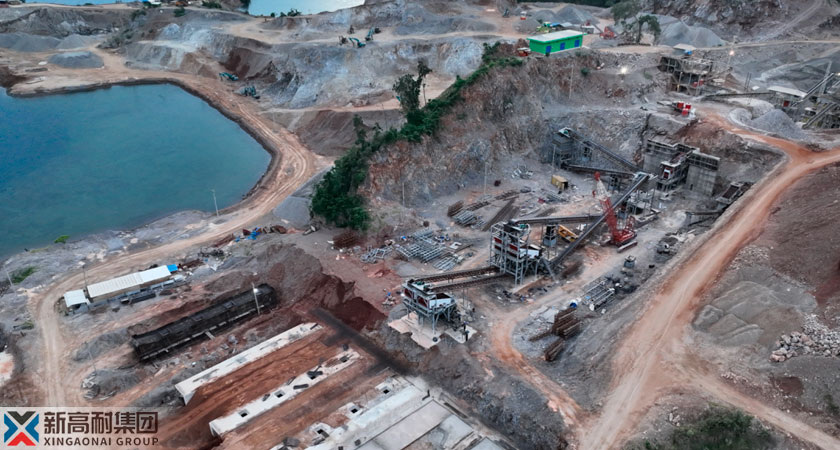At a time when infrastructure construction continues to heat up, limestone is the core raw material of building aggregates, and the construction standards of its processing production line directly affect the quality of the project and the benefits of the enterprise. This article will deeply analyze the system configuration and operation points of the 1,000-ton-per-hour limestone crushing and sand production line.

1. Process design
Typical four-stage crushing system configuration plan:
Primary crushing: jaw crusher is used to process ≤800mm raw materials, and the discharge is controlled at 150-300mm
Secondary medium crushing: cone crusher crushes the material to 50-80mm
Third-stage fine crushing: impact crusher outputs ≤30mm semi-finished products
Sand shaping: vertical shaft impact crusher realizes ≤5mm finished sand preparation
The matching three-stage screening system stabilizes the finished sand fineness modulus between 2.6-3.0 through the combination of probability screen, circular vibrating screen and air screen, and the stone powder content is accurately controlled at 7%-15%.
2. Selection of core equipment
Coarse crushing unit: PE1200×1500 jaw crusher, processing capacity 800-1000t/h
Medium and fine crushing unit: HPT500 cone crusher + PFQ1315 impact crusher combination, energy consumption is 35% lower than traditional equipment
Sand making module: VSI6X1263 vertical shaft impact crusher, with both shaping and sand making functions
Intelligent control system: equipped with online particle size analyzer and DCS centralized control system to achieve real-time particle size control
Through equipment linkage control, the actual operating energy consumption of the production line can be controlled at 1.8-2.3kW·h/ton, which saves more than 25% energy compared with traditional configuration.
3. Environmental protection technical specifications
Dust control: dry fog dust suppression + pulse bag dust removal combination, emission concentration <10mg/m³
Noise control: rubber shock pads are installed on the equipment foundation, and the factory boundary noise is ≤65dB(A)
Water circulation system: 500m³ sedimentation tank is configured to achieve zero discharge of production water
Intelligent monitoring: 60 IoT sensors are installed to monitor environmental protection data in real time
A demonstration project successfully achieved a PM2.5 value in the factory area that is better than the surrounding environment through closed factory building design and green isolation belt construction.
4. Economic Benefit Analysis
Take a project in East China as an example:
Investment structure: equipment accounts for 55%, civil engineering 25%, environmental protection 20%
Operation cost: 8.5 yuan per ton processing cost (including labor, energy consumption, and maintenance)
Benefit calculation: Based on the current sand price of 75 yuan/ton and 300 days of annual operation, the annual output value can reach 135 million yuan
Investment recovery period: Equipment investment recovers costs in about 14 months
The project adopts a mixed layout of mobile crushing station + fixed sand making line, which increases site utilization by 40% and shortens transfer time by 70%.
V. Industry Trend Outlook
Modular design: container-type crushing stations that can be assembled quickly are becoming more popular
Solid waste coordination: Breakthroughs in the coordinated disposal technology of construction waste and limestone
Digital twin: BIM-based production line simulation optimization has become a new trend
Sand and gravel co-production: The demand for flexible production systems for aggregates and machine-made sand has surged
A leading enterprise has reduced the number of operation and maintenance personnel for a single production line from 12 to 5 by introducing a 5G remote operation and maintenance system, and shortened the fault response time to within 15 minutes.
With the deepening application of intelligent manufacturing, the new generation of limestone sand production lines are accelerating towards "efficiency, greenness and intelligence". When planning production capacity, enterprises are advised to reserve 20% of production capacity flexibility and focus on the iterative upgrade of IoT control systems and environmental protection facilities in order to maintain continuous advantages in the fierce market competition.
The article starts from four dimensions: process flow, equipment selection, environmental protection requirements, and economic benefits. Combined with specific data and cases, it provides solutions with practical value. If you need to supplement specific equipment parameters or project cases, you can provide further detailed information to improve the content.
Article Title: A complete guide to the construction of a thousand-ton-per-hour limestone sand production line
Author:Xingaonai
Reprint URL: https://www.cadana.cn/industral-news/891.html
specialized in R&D and manufacturing of crushing, milling, screening, feeding, conveying, automation and other equipment.
